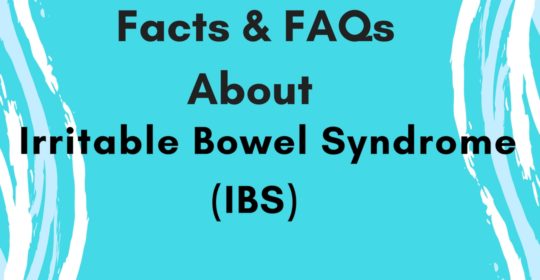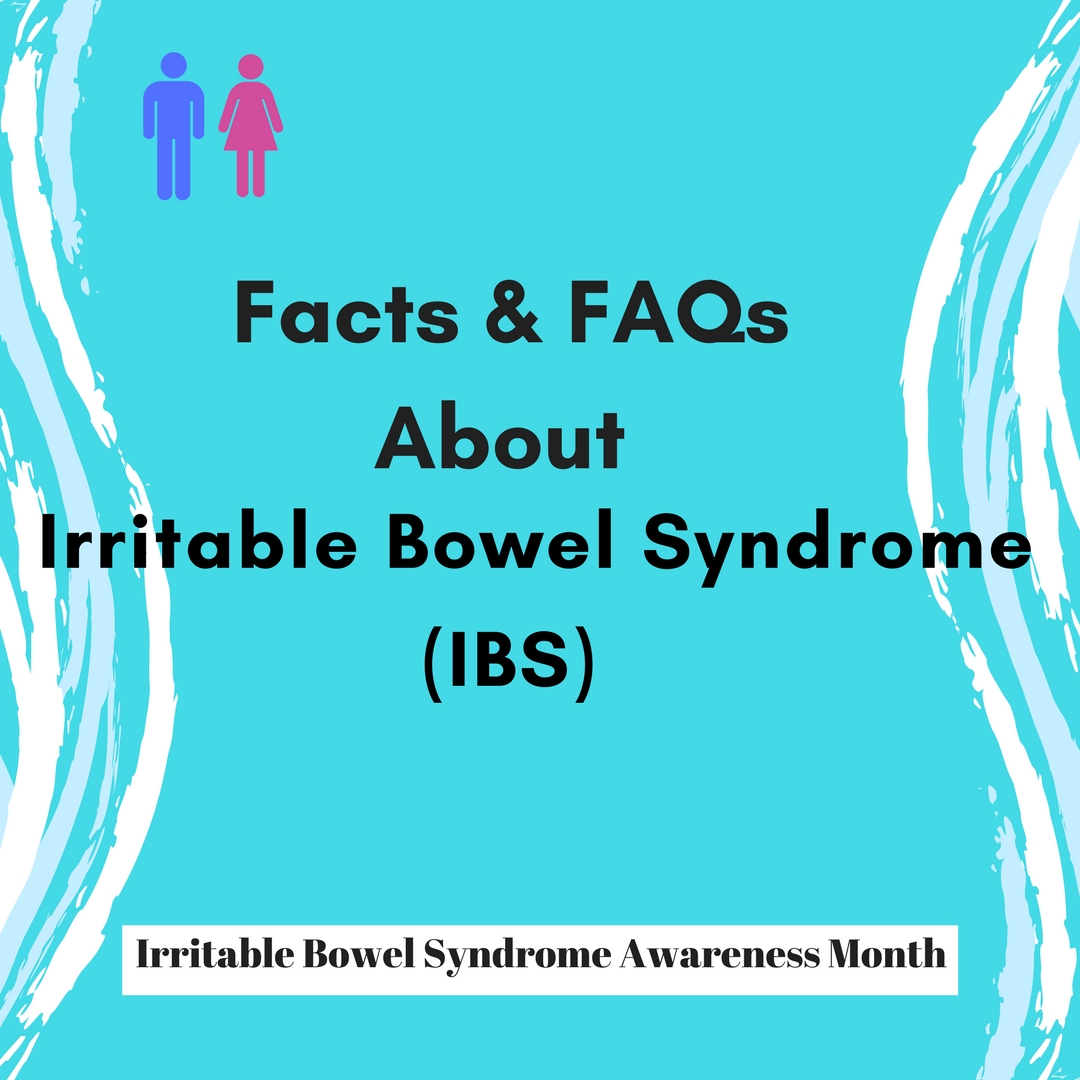
Facts and FAQ About Irritable Bowel Syndrome (IBS)

April is listed on the U.S. National Health Observances calendar as Irritable Bowel Syndrome (IBS) Awareness Month. In 1997, The International Foundation for Functional Gastrointestinal Disorders (IFFGD) designated April as IBS Awareness Month. During this month, they work to focus attention on important health messages about IBS diagnosis, treatment, and quality of life issues.
Facts about Irritable Bowel Syndrome (IBS)
Demographic
- IBS affects between 25 and 45 million people in the United States. About 2 in 3 IBS sufferers are female. About 1 in 3 IBS sufferers are male. IBS affects people of all ages, even children.
- Worldwide it’s estimated that 10-15% of the population has IBS.
- Most persons with IBS are under the age of 50. But many older adults suffer as well.
Cause & Effects
- The exact cause of IBS is not known. Symptoms may result from a disturbance in the way the gut, brain, and nervous system interact. This can cause changes in normal bowel movement and sensation.
- Stress does not cause IBS. However, because of the connection between the brain and the gut, stress can worsen or trigger symptoms.
- The impact of IBS can range from mild inconvenience to severe debilitation. It can control many aspects of a person’s emotional, social and professional life. Persons with moderate to severe IBS must struggle with symptoms that often impair their physical, emotional, economic, educational and social well-being.
Symptoms & Treatment
- IBS is unpredictable. Symptoms vary and are sometimes contradictory. Diarrhea can alternate with constipation. Long-term symptoms can disrupt personal and professional activities, and limit individual potential.
- Treatments are available for IBS to help manage symptoms. Not all treatments work for all people. Through research, better treatments may be found. Although IBS is common in the general population, few seek medical care for their symptoms.
- Nearly 2,000 patients with IBS reported in a survey by IFFGD that diagnosis of their IBS was typically made 6.6 years after the symptoms began.
- Approximately 20 to 40% of all visits to gastroenterologists are due to IBS symptoms. For those with IBS, an additional burden comes from living in a society where the word “bowel” may scarcely be spoken. Individuals must cope with multiple symptoms that affect every aspect of their lives. Those around them may be unaware of the impact, or even the existence, of the disorder.
- IBS can only be diagnosed by a medical professional.
Frequently Asked Questions
What is IBS?
IBS is best understood as a long-term or recurrent disorder of gastrointestinal functioning where the intestines are overly sensitive to factors that normally affect the gut such as diet, hormonal factors, activity, and stress. It usually involves the large intestine (colon) and small intestine with disturbances of intestinal/bowel (gut) motor function (motility), sensation, and secretion. These gut related activities are regulated by the brain. This may also be impaired, which is why IBS is often called a brain-gut disorder. These disturbances can produce symptoms of abdominal pain or discomfort, bloating or a sense of gaseousness, and a change in bowel habits (diarrhea and/or constipation)
What causes IBS?
The exact cause of IBS is unknown, but symptoms seem to be related to abnormal GI sensation and motility, which may result from disordered brain-but interactions, genetic factors, infection, and altered bacterial flora. It is likely that multiple factors influence symptoms.
Who is likely to develop IBS?
IBS can afflict anybody, although about two-thirds of those diagnosed are women and one-third are men. Onset can begin anywhere from adolescence to adulthood.
How common is IBS?
IBS affects an estimated 10 to 15 percent of the population or as many as 40 million Americans.
What is the test for IBS?
There currently is no consistent biological marker of IBS that can be tested to make the diagnosis. Research interest is underway to find a biological marker or set of markers. They include the use of a blood test, stool sample, or tissue sample from the colon. These would enhance the diagnostic accuracy of symptom criteria currently used in making the diagnosis.
How is IBS diagnosed?
Because IBS is a “functional’’ gastrointestinal disorder, meaning there is no structural cause to be detected, it is diagnosed based on a detailed medical history, specific constellation of symptoms, and a physical examination. Diagnostic tests may be performed depending on a person’s medical history and the presence of signs or symptoms suggestive of another disorder. Tests are usually normal in patients with IBS.
What is the Rome Criteria?
The Rome Criteria is a classification system that applies lists of symptoms and criteria generally agreed upon by experts to diagnosis a functional gastrointestinal disorder, such as IBS. These symptom-based criteria are modified at times as new knowledge comes to light, making diagnosis more precise. The Criteria are determined and published by the nonprofit Rome Foundation (www.RomeCriteria.org). The latest revision is known as Rome III; Rome IV will be released in the Spring of 2016.
Why is IBS so challenging to patients and physicians?
Patients with IBS have normal diagnostic tests, which is quite different from other well-accepted conditions such as diabetes or peptic ulcers that can be easily detected on tests alone. Symptoms are variable, their onset is often unpredictable, and their course can vary from day to day, month to month and year to year. Unlike conditions with one or two causes, IBS is influenced by multiple factors, making it more difficult to treat.
How is IBS currently treated?
Because there is no cure, IBS is treated by trying to manage symptoms. Patients should work in partnership with their physicians to come up with strategies, which may include diet and lifestyle changes, stress management, behavioral therapy, drug therapy, or pain management.
What is post-infectious irritable bowel syndrome (PI-IBS)?
Unlike inflammatory bowel diseases, such as Crohn’s disease or ulcerative colitis, in IBS there is usually no obvious infection or inflammation seen by colonoscopy or x-ray. However, microscopic changes may exist. In postinfectious IBS, individuals who had no previous IBS symptoms develop them after a GI infection even after the infection has cleared. In these cases, there may be microscopic signs of changes in the immune cells of the colonic lining. Experiencing severe stress at the time of the GI infection increases the risk of PI-IBS.
What is the relationship of stress to IBS?
Stress can be understood as anything that can stimulate the GI tract, including diet, hormonal changes, physical activity, and psychological stress. Stress is defined as a perceived or actual disturbance in the balance between mind, brain, and body. It can occur with or without conscious feelings of anxiety, distress, or anger. There are various types of stressors, which may impact IBS symptoms. Heightened sensitivity of the bowel in IBS can be in response to internal and external stressors. When stress is a factor, patients should work with their healthcare providers in developing a management plan to address it in order to decrease symptoms and improve the overall quality of life.
Is there an increased risk for developing IBS in war veterans?
IBS and other functional GI disorders disproportionately impact veterans and active duty military personnel. Soldiers deployed to combat areas face a heightened chance of developing IBS due to their exposure to risk factors such as GI infections and severe stress. For this reason, the Department of Veterans Affairs (VA) has put in place a “presumptive service connection” rule regarding applications for disability benefits for veterans affected by functional GI disorders who served in Southwest Asia during the Persian Gulf War.
Is IBS a psychological disorder?
No – IBS is not a psychological condition. In all persons, psychological stress can affect physical symptoms. Likewise, among people with IBS stress often affects gastrointestinal symptoms and the reaction to them. Additionally, having the disorder can itself cause psychological distress. Therefore, if any ongoing psychological disturbance is present, it makes sense to seek help and bring it under control.


Most Commented